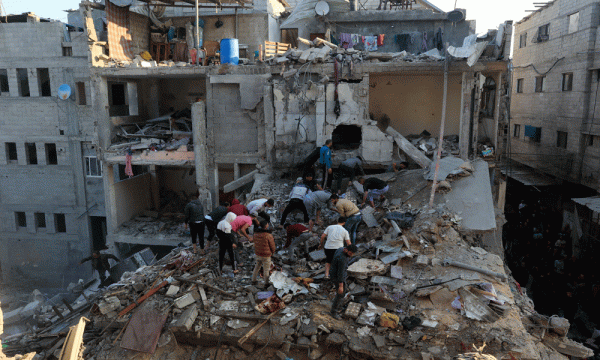
Human Rights Violations and Genocidal Campaigns in Gaza: International Responses and...
Human Rights Violations and Genocidal Campaigns...
Human Rights Violations and Genocidal Campaigns in Gaza: International Responses and Legal Obligations
The humanitarian crisis in Gaza, particularly over the last year, represents one of the most severe violations of international human rights law since World War II. Following the events of October 7, the international community has witnessed a brutal military response that has resulted in genocidal attacks, ethnic cleansing, and collective punishment of Palestinians. These actions risk dismantling the global multilateral system built to prevent such atrocities.
Based on the 18 Special Rapporteurs, Independent Experts, and members of Working Groups, signed on October 11, 2024, it is clear that Israel's actions constitute gross violations of international human rights and humanitarian law. as for this crisis is deepening, with grave implications for peace and justice in the region. This statement underscores the need for urgent international intervention to prevent further escalation and hold Israel accountable for its atrocities, which include the intentional targeting of civilians, the destruction of essential infrastructure, and the perpetration of collective punishment in Gaza.
In addition, over the past eight months, the International Court of Justice (ICJ) issued two advisory opinions concerning Israel’s actions. One of these rulings followed a complaint from South Africa against Israel, leading the ICJ to demand immediate measures from Israel, including halting military operations in Gaza and preventing further acts that could amount to genocide, as stipulated by the Genocide Convention. Israel has disregarded these judicial orders, continuing its violations with impunity. This non-compliance underscores the urgent need for enhanced international enforcement mechanisms and swift action to hold Israel accountable for its violations.

The term "genocide" has become central to understanding the scale and intent behind Israel’s actions in Gaza. Israeli leaders have not only engaged in rhetoric that calls for collective punishment but have also enacted policies aimed at inflicting widespread harm on the civilian population. Only two days after the start of the conflict On October 9, Defense Minister Gallant openly advocated for a complete siege of Gaza, cutting off electricity, food, water, and fuel. This siege, alongside Prime Minister Netanyahu’s invocation of religious justifications for total destruction, reveals a deliberate intent to eradicate the Palestinian people, a hallmark of genocidal campaigns.
The impact on Gaza has been catastrophic. Entire neighborhoods have been reduced to rubble through indiscriminate airstrikes, with civilians—pregnant women, children, the elderly, and humanitarian workers—bearing the brunt of this violence. Essential infrastructure, such as hospitals and schools, has been obliterated, leaving survivors in dire conditions, facing starvation, disease, and the psychological trauma of losing loved ones and their homes.
These actions constitute clear violations of international law, particularly the Geneva Conventions, which prohibit collective punishment and attacks on civilian infrastructure. The total siege of Gaza has exacerbated the humanitarian crisis, resulting in widespread starvation, the collapse of healthcare services, and the spread of preventable diseases due to the destruction of medical facilities and lack of essential supplies. Furthermore, designated humanitarian zones have not been spared from the bombings, turning spaces meant to protect civilians into dangerous areas of conflict.
In addition to these severe violations, there is a broader assault on Palestinian culture and identity. The deliberate targeting of cultural institutions, schools, and heritage sites in Gaza is part of a calculated effort to erase the presence and history of Palestinians. This form of cultural genocide poses an existential threat to the future of Palestinians as a people. Similarly, in the West Bank, the Israeli has continued its policy of land annexation and displacement, further undermining Palestinian sovereignty and systematically targeting their resources.
Despite overwhelming evidence of these atrocities, the international community has largely failed to hold Israel accountable. The International Criminal Court (ICC) and the International Court of Justice (ICJ), have been slow to act, allowing Israel’s actions to continue unchecked. Provisional measures issued by the ICJ to prevent further genocidal acts have been ignored by Israel, and ICC arrest warrants for Israeli leaders have yet to materialize. This inaction by global legal bodies and specially security council, alongside the failure of world leaders to intervene, has not only emboldened Israel but has also eroded the credibility of international institutions meant to uphold human rights.
Finally, the international community’s inability to prevent or halt these atrocities, despite clear evidence of genocide and ethnic cleansing, reflects a profound failure in the global system designed to protect human rights. Immediate action is required to stop the violence, restore international law, and provide justice to the victims.
 Reload
Reload



